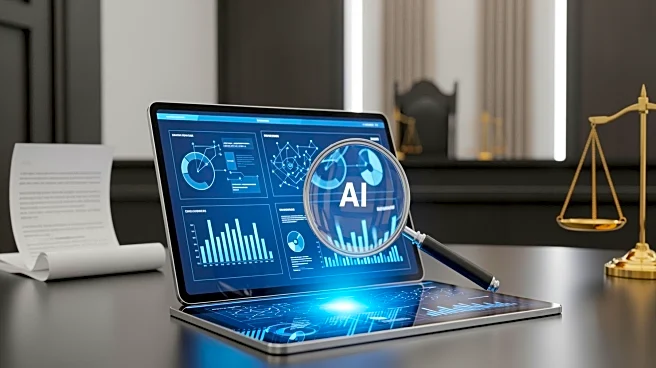What's Happening?
Artificial intelligence is increasingly being integrated into the preparation process for civil jury trials, offering litigators new tools to enhance their strategies. AI can analyze large volumes of case documents, pleadings, and deposition transcripts
to help trial teams identify and refine persuasive themes. It can simulate jury reactions to different arguments, providing insights similar to those gained from traditional mock jury trials but with less time and logistical effort. Additionally, AI assists in witness preparation by summarizing relevant documents, creating outlines, and simulating opposing counsel's questioning. These capabilities allow attorneys to focus on more strategic tasks, improving trial readiness and performance.
Why It's Important?
The integration of AI into trial preparation represents a significant shift in legal practice, potentially increasing efficiency and effectiveness in the courtroom. By leveraging AI, litigators can streamline their preparation processes, saving time and resources while sharpening their case strategies. This technological advancement may lead to more focused and persuasive storytelling, which is crucial for successful jury trials. As AI tools become more prevalent, they could alter traditional trial strategies, possibly reducing the need for lengthy and costly mock jury trials. The legal profession stands to benefit from these innovations, as they offer practical ways to enhance courtroom performance without sacrificing human judgment.
What's Next?
As AI continues to evolve, its role in legal practice is likely to expand. Attorneys will need to remain vigilant about ethical considerations, ensuring AI-generated outputs are accurate and secure. The legal profession may see increased adoption of AI tools, with firms investing in technology to gain a competitive edge. This could lead to changes in how trials are conducted, with AI playing a more central role in strategy development and witness preparation. Legal professionals will need to balance traditional skills with modern tools to remain effective in an evolving landscape.
Beyond the Headlines
The use of AI in legal practice raises important ethical and confidentiality concerns. Attorneys must ensure that AI tools comply with data protection standards and firm policies. The reliance on AI also underscores the need for ongoing education and adaptation within the legal profession, as practitioners must stay informed about technological advancements and their implications. This shift may lead to broader discussions about the role of technology in law and its impact on the justice system.

















